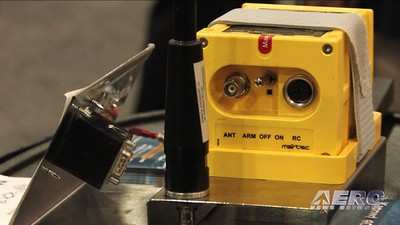Mon, Jun 21, 2010
Implementation Date For The Ban Is Still Not Set In Stone
Effective in August, the FCC is prohibiting further
certification, manufacture, importation, sale or use of 121.5 MHz
emergency locator transmitters. The date of compliance by the FCC
has not yet been announced. AEA, along with other
Associations' leadership, is working with the FAA and the FCC to
postpone implementation and resolve this issue, and AEA says it
will post weekly updates on the website to address this critical
issue.

406 MHz ELT File Photo
In the FCC's Third Report and Order for
2010, adopted June 1, 2010, and published June 15, 2010, the FCC
has prohibited further certification, manufacture, importation,
sale or use of 121.5 MHz ELTs.
Previously, the Cospas-Sarsat satellite system monitored distress
signals on the 121.5 MHz frequency and relayed those signals to
search-and-rescue authorities. As it first announced in October
2000, Cospas-Sarsat stopped monitoring 121.5 MHz signals as of Feb.
1, 2009. It stopped processing distress signals from 121.5 MHz
emergency radio beacons because of accuracy and false-alert
problems. With the support of international aviation and maritime
organizations, Cospas-Sarsat has urged users of 121.5 MHz ELTs and
EPIRBs to switch to 406 MHz ELTs and emergency position indicating
radio beacons.
As the commission noted in the second FNPRM, NOAA, the U.S. Coast
Guard, the U.S. Air Force, and NASA, which jointly administer the
Cospas-Sarsat system in the United States, strongly recommended
users of 121.5 MHz beacons switch to 406 MHz beacons.
After reviewing the comments from the 2006 proposal, the FCC
concluded it should go ahead with the ban.

The AEA was not made aware of this
issue until Monday, June 21st, and has begun working with the FAA,
FCC and other associations to allow for a timely transition to this
new FCC prohibition without grounding thousands of general aviation
aircraft. At this time, the AEA recommends members delay selling
any new 121.5 MHz ELTs until further understanding of this new
prohibition can be understood and a realistic timeline for
transition can be established.
More News
Outboard Section Of The Right Wing And The Right Flap Separated In Flight And The Airplane Impacted A Farm Field Analysis: The pilot was approaching his destination airport under i>[...]
Final Approach Fix The fix from which the final approach (IFR) to an airport is executed and which identifies the beginning of the final approach segment. It is designated on Gover>[...]
"Our choice of when to respond, how to respond and on which targets to respond is a consideration that we make every time... Netanyahu also noted that anyone attacking Israel &ldqu>[...]
Estimated (EST) When used in NOTAMs “EST” is a contraction that is used by the issuing authority only when the condition is expected to return to service prior to the e>[...]
Aero Linx: Coalition of Airline Pilots Associations (CAPA) The Coalition of Airline Pilots Associations (CAPA) is the world’s largest pilot trade association representing ove>[...]
 NTSB Final Report: Cessna 177B
NTSB Final Report: Cessna 177B ANN's Daily Aero-Term (05.08.25): Final Approach Fix
ANN's Daily Aero-Term (05.08.25): Final Approach Fix Aero-News: Quote of the Day (05.08.25)
Aero-News: Quote of the Day (05.08.25) ANN's Daily Aero-Term (05.09.25): Estimated (EST)
ANN's Daily Aero-Term (05.09.25): Estimated (EST) ANN's Daily Aero-Linx (05.09.25)
ANN's Daily Aero-Linx (05.09.25)




